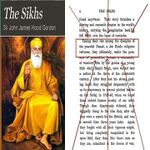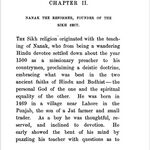Guru Nanak
Gurū Nānak (15 April 1469 – 22 September 1539; Gurmukhi: ਗੁਰੂ ਨਾਨਕ, also referred to as Bābā Nānak ('father Nānak'), was the founder of Sikhism and is the first of the ten Sikh Gurus. His birth is celebrated worldwide as Guru Nanak Gurpurab on Katak Pooranmashi ('full-moon of Kattak'), i.e. October–November.
Nanak is said to have travelled far and wide across Asia teaching people the message of ik onkar (ੴ, 'one God'), who dwells in every one of his creations and constitutes the eternal Truth. With this concept, he would set up a unique spiritual, social, and political platform based on equality, fraternal love, goodness, and virtue.
Birth


Nanak was born on 15 April 1469 at Rāi Bhoi Kī Talvaṇḍī village (present-day Nankana Sahib, Punjab, Pakistan) in the Lahore province of the Delhi Sultanate,[1][2] although according to one tradition, he was born in the Indian month of Kārtik or November, known as Kattak in Punjabi.[3]
Most janamsakhis (ਜਨਮਸਾਖੀ, 'birth stories'), or traditional biographies of Nanak, mention that he was born on the third day of the bright lunar fortnight, in the Baisakh month (April) of Samvat 1526.[4]These include the Puratan ('traditional' or 'ancient') janamsakhi, Miharban janamsakhi, Gyan-ratanavali by Bhai Mani Singh, and the Vilayat Vali janamsakhi.[5] Gurbilas Patashahi 6, written 1718, also attributed to Bhai Mani Singh contradicts Mani Singh’s Janamsakhi as it instead says Guru Nanak was born on the full moon of Katak.[6] The Sikh records state that Nanak died on the 10th day of the Asauj month of Samvat 1596 (22 September 1539 CE), at the age of 70 years, 5 months, and 7 days. This further suggests that he was born in the month of Vaisakh (April), not Kattak (November).[7]
Sir John James Hood Gordon, in his book on "The Sikhs" writes that:- "Nanak was a Jat". He was born in 1469 in a village near Lahore in the Punjab, the son of a Jat farmer and small trader.[8]
References
- ↑ Singh, Khushwant (2006). The Illustrated History of the Sikhs. India: Oxford University Press. pp. 12–13. ISBN 0-19-567747-1.p.12-13
- ↑ Grewal, J. S. (1998) [First published 1990]. "The Sikhs of the Punjab". In Johnson, Gordon; Bayly, C. A.; Richards, John F. (eds.). The New Cambridge History of India (pbk ed.). Cambridge: Cambridge University Press. ISBN 978-0-521-63764-0.p.6
- ↑ Gupta, Hari Ram (1984). History of the Sikhs: The Sikh Gurus, 1469-1708. Munshiram Manoharlal. ISBN 978-81-215-0276-4. p. 49.
- ↑ Gupta, Hari Ram (1984). History of the Sikhs: The Sikh Gurus, 1469-1708. Munshiram Manoharlal. ISBN 978-81-215-0276-4. p. 49.
- ↑ Gupta 1984, p. 50.
- ↑ Singh, Dr. Trilochan. Guru Nanak: Founder of Sikhism: A Biography (PDF). pp. 489–491.
- ↑ Gupta 1984, p. 54.
- ↑ Sir John James Hood Gordon, in his book on "The Sikhs",p.2
Back to The Reformers

